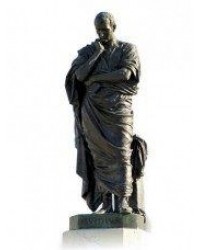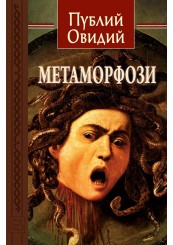Publius Ovidius Naso (Ovid)

Publius Ovidius Naso (43 BC-AD 17/18), known as Ovid in the English-speaking world, was a Roman poet who lived during the reign of Augustus. He was a contemporary of the older Virgil and Horace, with whom he is often ranked as one of the three canonical poets of Latin literature. The Imperial scholar Quintilian considered him the last of the Latin love elegists. He enjoyed enormous popularity, but, in one of the mysteries of literary history, was sent by Augustus into exile in a remote province on the Black Sea, where he remained until his death. Ovid himself attributes his exile to carmen et error, "a poem and a mistake", but his discretion in discussing the causes has resulted in much speculation among scholars.
The first major Roman poet to begin his career during the reign of Augustus, Ovid is today best known for the Metamorphoses, a 15-book continuous mythological narrative written in the meter of epic, and for works in elegiac couplets such as Ars Amatoria ("The Art of Love") and Fasti. His poetry was much imitated during Late Antiquity and the Middle Ages, and greatly influenced Western art and literature. The Metamorphoses remains one of the most important sources of classical mythology.
Ovid talks more about his own life than most other Roman poets. Information about his biography is drawn primarily from his poetry, especially Tristia 4.10, which gives a long autobiographical account of his life. Other sources include Seneca the Elder and Quintilian.
Ovid was born in Sulmo (modern Sulmona), in an Apennine valley east of Rome, to an important equestrian family, on 20 March, 43 BC. That was a significant year in Roman politics. He was educated in rhetoric in Rome under the teachers Arellius Fuscus and Porcius Latro with his brother who excelled at oratory.
His father wanted him to study rhetoric toward the practice of law. According to Seneca the Elder, Ovid tended to the emotional, not the argumentative pole of rhetoric. After the death of his brother at 20 years of age, Ovid renounced law and began travelling to Athens, Asia Minor, and Sicily. He held minor public posts, as one of the tresviri capitales, as a member of the Centumviral court and as one of the decemviri litibus iudicandis, but resigned to pursue poetry probably around 29–25 BC, a decision his father apparently disapproved of.
Ovid's first recitation has been dated to around 25 BC, when he was eighteen. He was part of the circle centered on the patron Marcus Valerius Messalla Corvinus, and seems to have been a friend of poets in the circle of Maecenas. In Trist. 4.10.41–54, Ovid mentions friendships with Macer, Propertius, Horace, Ponticus and Bassus (he only barely met Virgil and Tibullus, a fellow member of Messalla's circle whose elegies he admired greatly). Ovid was very popular at the time of his early works, but was later exiled by Augustus in AD 8.
He married three times and divorced twice by the time he was thirty years old. He had one daughter, who eventually bore him grandchildren. His last wife was connected in some way to the influential gens Fabia and would help him during his exile in Tomis.



